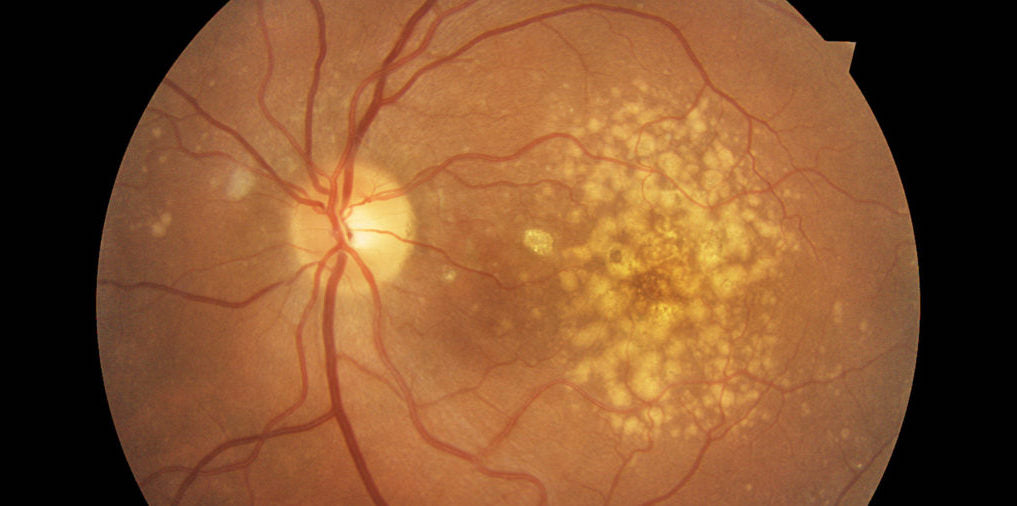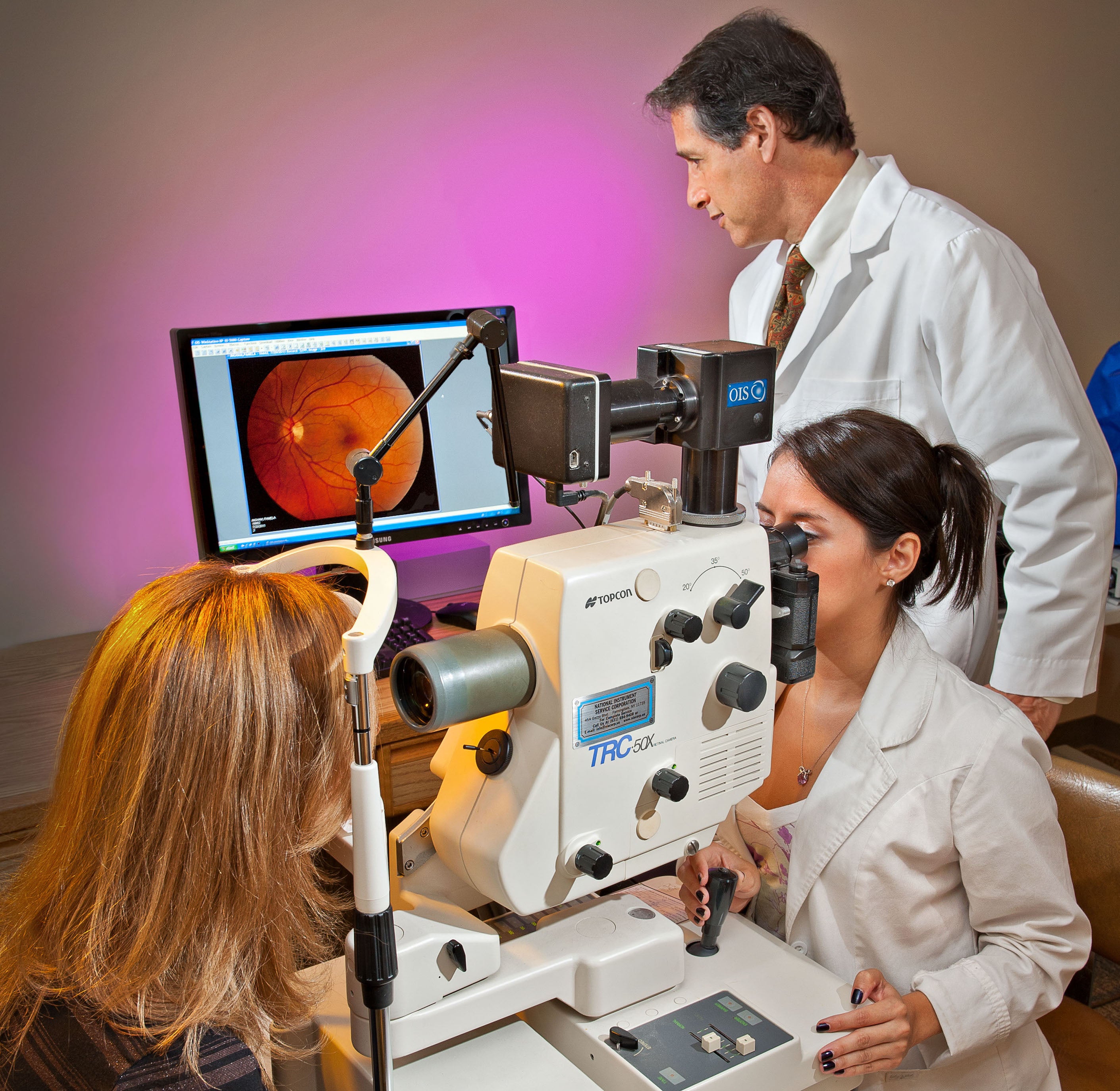Macular Degeneration
Age-Related Macular Degeneration (AMD) is a common disease of eye health, associated with aging, that can gradually destroys sharp, central vision. The retina is the very thin tissue that lines the inside of the eye and contains rods and cones - the light-sensing cells that send visual signals to the brain. Sharp, clear, 'straight ahead' vision is provided by the macula, which is in the center of the retina. When the macula becomes damaged through ocular disease, it can cause difficulty with "detail" vision, including reading, seeing the detail in faces, using a computer, filling out a checkbook, looking at photographs - and more.

Types of Macular Degeneration
There are two types of macular degeneration - "dry" and "wet." The dry form involves thinning and atrophy of the delicate retinal tissue, whereas the wet form involves the formation of abnormal new and fragile blood vessels (neovascularization) that leak serum and blood, and can cause vision loss within days and ultimately result in scarring.
Dry macular degeneration is the most common type of macular degeneration, affecting approximately 9 out of 10 people who suffer from the disease. Yellow deposits containing metabolic debris are called "drusen," and these form under the retina, affecting healthy retinal cell metabolism. Symptoms of mild and moderate dry macular degeneration can include patchy loss of "straight ahead" vision, or there may be no symptoms at all.
In wet macular degeneration, "straight ahead" vision can become distorted or lost entirely in a short period of time, sometimes within days. Wet macular degeneration accounts for approximately 1 in 10 cases of AMD, however it results in 90% of the cases of legal blindness.
Treatment of Dry Macular Degeneration

The goal in dry macular degeneration is to prevent advancement with a specific high-dose AREDS 2 formula of antioxidants and zinc recommended by the United States National Eye Institute, which may delay or prevent intermediate AMD from progressing to the advanced stage. If dry age-related macular degeneration (AMD) reaches the advanced stages, it can cause permanent and severe vision loss.
The "wet" form of the disease, on the other hand, requires medical treatment with injections into the back of the eye of the drugs Avastin, Lucentis or Eyelea. These compounds cause the abnormal blood vessels to shrink by binding to and limiting the biologic activity of human vascular endothelial growth factor (VEGF). Because the eye continues to produce VEGF, periodic of this drug is required - between every 1-3 months. Some studies show that taking AREDS 2 vitamins with wet macular degeneration may reduce the frequency of injections needed.
How many people have macular degeneration?
Nearly 2 million Americans age 40 and older have advanced AMD, and more than 7 million people with intermediate AMD are at substantial risk for vision loss. The government estimates that by 2020 there will be 3 million people with advanced AMD.
What is the difference among early, intermediate and advanced forms?
All wet age-related macular degeneration (AMD) is considered advanced; however, there are three stages of Dry Macular Degeneration:
- Early - several small drusen or a few medium-sized drusen in the retina. No vision loss.
- Intermediate - Many medium-sized drusen or one or more large drusen. More light for tasks such as reading may be needed. A blurry or gray spot may interfere with vision.
- Advanced - large number of drusen deposits and a breakdown of tissue in the retina. A large blurry spot is seen in the center of vision and can cause a complete loss of central vision.
How is macular degeneration diagnosed?
An eye care professional will perform a dilated eye exam, visual acuity test, and view the back of the eye using a procedure called fundoscopy, as well as tests including OCT (optical coherence tomography) and FA (fluorescein angiography) to help diagnose age-related macular degeneration (AMD).

What new research is being done to find a cure for macular degeneration?
Genetic studies, retinal transplants, stem cell treatments, computer chip implants and more are being studied. Small implants that slowly release the injectable drugs so that fewer injections are needed will be available soon. Ongoing research continues with studies exploring environmental, genetic, and dietary factors that may contribute to AMD. New drugs that better stop the growth of the wet macular degeneration blood vessels from growing are
Is macular degeneration hereditary?
It is now known there is a strong hereditary component to age-related macular degeneration, and genetic tests that assess a person's AMD risk are available to be performed in doctors' offices. These tests can also determine whether the zinc and copper in the regular AREDS 2 formulation is helpful or harmful to a particular person, depending upon their blood's "complement factors."
However, hereditary risk is not the same as real-world risk. There are things you can do to dramatically lower your actual risk, including not smoking, lowering your cholesterol and heating a healthy diet. Many doctors recommend AREDS 2 or AREDS 2 without zinc nutritional supplements for their patients at high genetic risk.
Can vitamin supplements help treat macular degeneration?
The National Eye Institute’s Age-Related Eye Disease Studies (AREDS and AREDS 2) found that taking a specific high dose formula of antioxidants and zinc was beneficial in preventing progression of macular degeneration in people with intermediate or advanced dry macular degeneration. The current recommendations are 500 milligrams of vitamin C, 400 International Units of vitamin E, 10 mg lutein, 25-80 milligrams of zinc as zinc oxide, and 1-2 milligrams of copper as cupric oxide to offset some of the effects of zinc. However, genetic testing has shown that approximately 1 out of 4 people do worse when the AREDS 2 formula has zinc.
You should always talk with your physician before taking any supplements because the formula may be contraindicated due to other medical conditions that you have or medications that you are taking.
